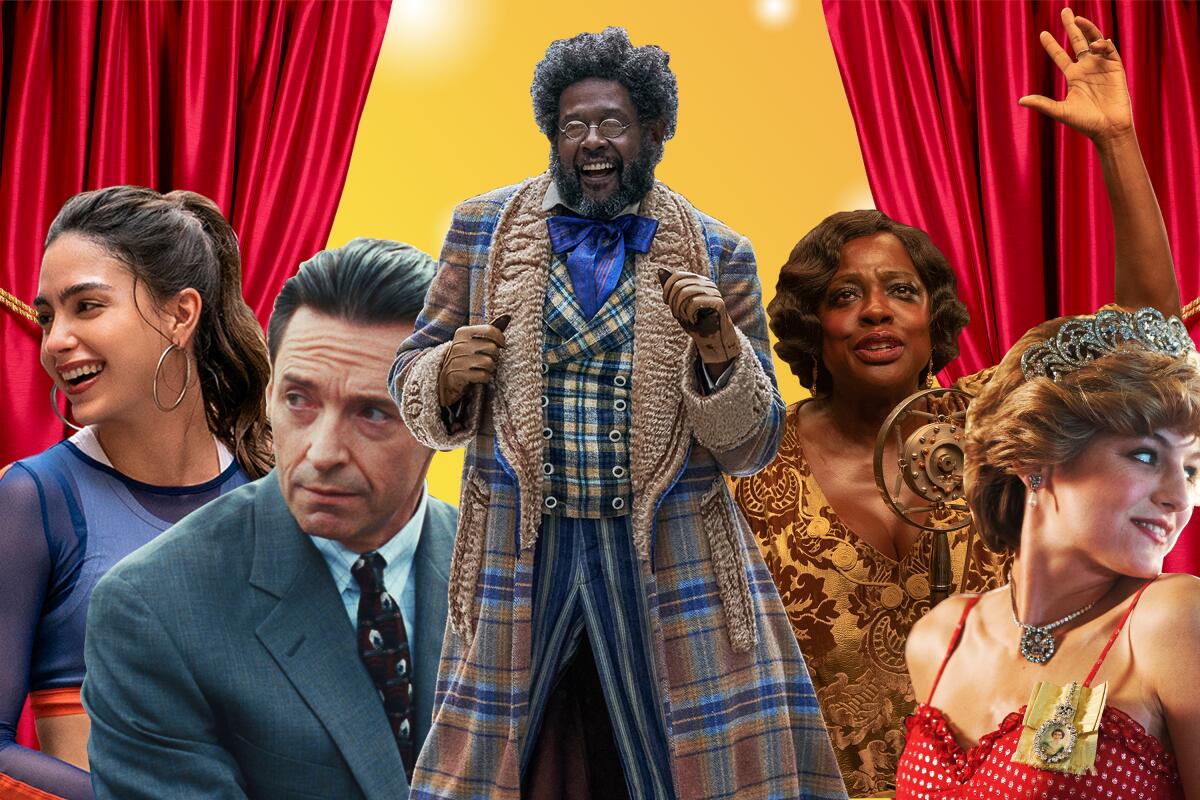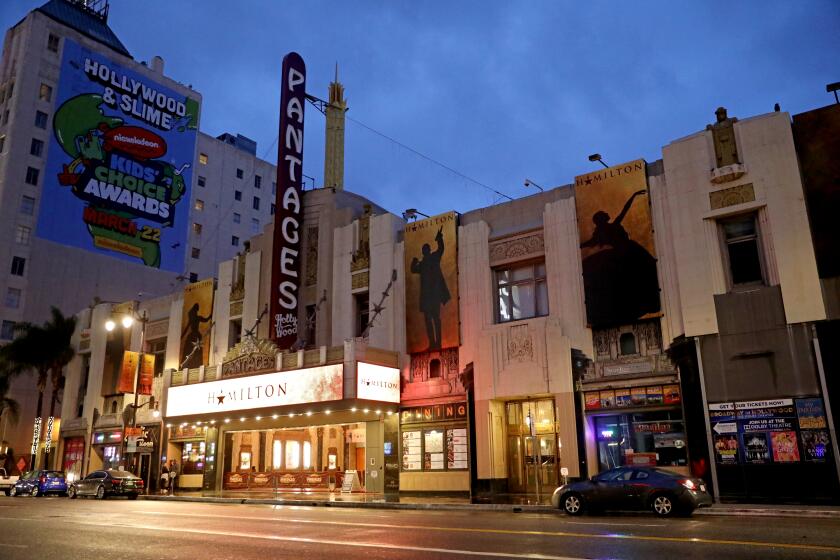Commentary: Theater is Hollywood’s talent incubator. It’s time Hollywood stepped up to save it

- Share via
The vast majority of my year was spent on the sofa. I sheltered in place with sweat suits, snacks and soft woven blankets, and I watched more movies and TV shows than I ever thought I would.
It’s the opposite of my prepandemic routine, which regularly required putting on heeled shoes and real pants to watch something onstage. But even with countless venues across the country sitting dark since government-mandated shutdowns in March because of COVID-19, the theater industry has profoundly shaped the year in culture. Even from the comfort of my couch, I owe the theater a debt of gratitude.
We all do.
I’m not even counting live recordings of stage shows — the hit musical “Hamilton” on Disney+, the Broadway play “What the Constitution Means to Me” on Amazon Prime or David Byrne’s “American Utopia” on HBO — or the exciting innovations in virtual theater, including star-studded versions of classic texts and wholly new productions that embraced the screen.
No — I mean that, in ways large and small, the theater is, quite literally, behind some of the best movies and TV shows of 2020. Consider Hulu’s deliciously dark comedy “The Great,” which showrunner Tony McNamara first put up as a play in Sydney in 2008; Starz’s strip-club drama “P-Valley,” which creator Katori Hall debuted on a Minneapolis stage in 2015; AMC Networks’ “Quiz,” which James Graham initially wrote as a 2017 play; Amazon’s “One Night in Miami,” which Kemp Powers unveiled in a Los Angeles theater in 2013; and Netflix’s five-season saga “The Crown,” which grew out of creator Peter Morgan‘s 2013 play “The Audience.” With movies like “The Boys in the Band” and “Ma Rainey’s Black Bottom,” Netflix made the translation, respectively, of Mart Crowley’s landmark play and August Wilson’s breakout work more direct — even casting actors who’d previously played their roles onstage.
Netflix’s star-studded spin on the Broadway musical underscores a major shortcoming of the landmark 2019 profit-sharing agreement between producers and actors.
Expand the field to include the pipeline of talent from theater to film and TV, and the bench gets deeper still: David E. Talbert (Netflix’s movie musical “Jingle Jangle”), Steve Yockey (HBO Max’s “The Flight Attendant”), Joe Tracz (Netflix holiday series “Dash & Lily”), Michaela Coel (HBO’s masterpiece “I May Destroy You”), Julian Fellowes (Epix’s period soap “Belgravia”) and Radha Blank (Netflix awards contender “The 40-Year-Old Version”) all have roots in the stage.
Once you throw it open to the many, many actors who cut their teeth in the theater world and gave standout screen performances this year, it can all seem rather overemphatic. That includes both the already famous — Hugh Jackman in “Bad Education,” Frances McDormand in “Nomadland,” Riz Ahmed in “The Sound of Metal,” Carey Mulligan in “Promising Young Woman” — and the “fresh faces” — Jeremy Pope in “Hollywood,” Kingsley Ben-Adir in “High Fidelity” and “One Night in Miami,” Ariana DeBose in “The Prom,” Paul Mescal in “Normal People.” (If I left out your favorite, I apologize, but that there are too many to mention here is exactly my point.)
The phenomenon dates back to the very advent of cinema, and entertainment reporters note the “trend” almost annually at this point, particularly when it comes time to hand out awards. But this year is different: Movie studios, TV networks, streaming platforms and viewers alike have enjoyed hours upon hours of storytelling that owes something to the theater industry in 2020, even as that industry has been more or less on life support since the pandemic began.
Film and TV productions have found a way to get back up and running but theaters are still closed. Arts workers are among those who’ve lost months of wages and commitments to work — a necessity in an industry that runs from gig to gig. And though Congress recently passed a stimulus bill that includes a $15-billion “Save Our Stages” provision with help for venue operators, it extends weekly unemployment payments of $300 only through mid-March and fails to provide COBRA funding for those losing their health insurance during the industry shutdown. A revival of the Federal Theatre Project, a government-funded initiative that directly employed artists to create new work during the Great Depression, could very well help.
But if Hollywood is going to continue reaping the creative benefits of the theater — the actors’ training, the ambitious storytelling, the characters fleshed out over countless rewrites — it bears an obligation, artistic and moral, to assist the theater in its time of need. (If media conglomerates are regularly donating to the Actors Fund, the Dramatists Guild Foundation and other pandemic relief efforts, they are doing so without public fanfare.)
Even by the most self-serving logic, it would behoove entertainment business leaders to step up. Countless “prestige” TV series have been staffed with playwrights, and movie musicals, generally the most costly stage-to-screen adaptations, have proved to be box-office winners. One idea: Make the funding for the theater that “Slave Play” author Jeremy O. Harris and Katorie Hall have secured as part of their TV overall deals standard practice.
After all, no one knows what theater, and the community that’s formed around it, will look like after this crisis. How many plays will debut to then be adapted into movies and TV shows? How many dramatists will be around to work in writers rooms? How many stage actors will the broader public “discover” onscreen? If theater as an industry continues to suffer, as it has for nine months and counting, Hollywood — and its audience — stand to lose.
Donate the cost of a canceled ticket, take an online dance class, buy a piece of fine art: Here are 22 ways to help artists weather the coronavirus storm.
It’s not too late for Hollywood to come together on a concerted effort for theater industry relief — especially in the coming year, which is yet again full to bursting with buzzy projects with ties to the stage. Among them are “Encanto” (co-written by Charise Castro Smith), “Raya and the Last Dragon” (co-written by Qui Nguyen), “Zola” (Jeremy O. Harris), “The United States vs. Billie Holiday” (Suzan-Lori Parks) and a pair of Aretha Franklin projects — the movie “Respect” (Tracy Scott Wilson) and Nat Geo’s series “Genius: Aretha” (with Parks as showrunner).
Others are adaptations, like Lin-Manuel Miranda’s breakout piece “In the Heights,” Florian Zeller’s drama “The Father,” Tom MacRae and Dan Gillespie Sells’ musical “Everybody’s Talking About Jamie,” J.T. Rogers’ Tony Award winner “Oslo,” Kata Wéber’s work “Pieces of a Woman” and Steven Spielberg’s remake of Leonard Bernstein and Stephen Sondheim’s classic “West Side Story.”
If you’re like me and you spent this singular year at home, retreating from the world’s heartbreaks and horrors into the aforementioned movies and TV shows, I encourage you to do what you can to help arts workers in your communities. And when it’s safe to attend live performances again, I hope you‘ll join me in getting off the couch and going to see something in person. Even if you’ve never seen a musical or stage play, even if you’ve never set foot in such a venue before, your movie and TV choices are proof that you’ve actually been a fan of theater all along.
More to Read
The complete guide to home viewing
Get Screen Gab for everything about the TV shows and streaming movies everyone’s talking about.
You may occasionally receive promotional content from the Los Angeles Times.








